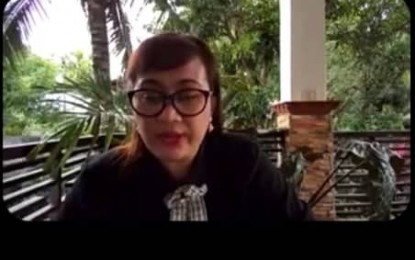
SIGN LANGUAGE. Antique Provincial Board Mayella Mae Plameras-Ladislao rallies her colleagues to support the "The Filipino Sign Language (FSL) Ordinance of 2021 of the Province of Antique" during their regular session on Thursday (Sept. 23, 2021). The ordinance was approved on final reading and seeks to give importance to the fight for equal rights of Persons with Disabilities, particularly the deaf. (PNA photo by Annabel Consuelo J. Petinglay)
SAN JOSE DE BUENAVISTA, Antique – The use of Filipino Sign Language (FSL) will soon be used in schools, workplaces, and in the media to give importance to the fight for equal rights of Persons with Disabilities (PWDs), especially for hearing-impaired individuals.
Antique schools will soon be teaching FSL as a separate subject for elementary and secondary learners based on the approved “The Filipino Sign Language (FSL) Ordinance of 2021 of the Province of Antique” authored by Board Member Mayella Mae Plameras-Ladislao.
The Provincial Board passed the ordinance during Thursday's regular session.
“This ordinance enjoins schools, offices or workplaces, and mass media in the attainment of the objective to use the FSL as the means of communication and a vehicle for ensuring the inclusion of the deaf people in society,” Ladislao added.
The ordinance mandates the Department of Education (DepEd), Commission on Higher Education (CHED), Technical Education and Skills Development Authority (TESDA) in Antique to use FSL and have it taught as a separate subject in their curriculum
“Under this ordinance, the local government agencies and centers which provide education, especially catering deaf students, must undertake regular pre-and work-related training to teachers,” she said.
In workplaces, government offices must take reasonable measures to encourage the use of FSL not only among its deaf and hard of hearing employees but must also conduct awareness and training seminars on the rationale and use of sign language.
“Media in the province of Antique shall be required to have FSL interpreter insets compliant with the accessibility standards for television in their news and public affairs program,” the board member added.
“In the province of Antique, there are 351 deaf or hard of hearing individuals,” said Ladislao, citing data from the Department of Health (DOH) Philippine Registry for Persons with Disabilities as of Jan. 1, 2008 to Aug. 30, 2021.
She added that only the towns of Sibalom and Caluya have no record of hard of hearing residents based on the registry.
The Antique Provincial Social Welfare and Development Office will spearhead the monitoring and implementation of the ordinance.
FSL is provided under Republic 111061 or the FSL Act of 2018 and the United Nations Convention on the Rights of PWDs, Ladislao said.
The local legislation will take effect 10 days after its signed by Antique Governor Rhodora J. Cadiao and its publication.
FSL is the official sign language of the deaf community in the Philippines and is rooted in Filipino culture. (PNA)
